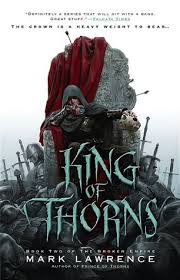
2‑King of Thorns
Chapter 8: Four years earlier
by Mark, Lawrence,The chapter “Four Years Earlier” serves as a flashback, providing critical context for the events unfolding in *King of Thorns*. It revisits a pivotal period in the protagonist’s past, shedding light on the formative experiences that shaped his current trajectory. The narrative delves into the challenges and conflicts he faced during this time, offering insights into his motivations and the origins of his ruthless demeanor. This temporal shift underscores the nonlinear storytelling style characteristic of the series.
The excerpt hints at a younger, less hardened version of the protagonist, contrasting sharply with his present-day persona. Through vivid recollections, the chapter explores themes of power, survival, and the moral ambiguities of leadership. The protagonist’s early struggles—whether against rivals, circumstances, or his own limitations—reveal the seeds of his later ambitions. The flashback structure enriches the reader’s understanding of his complex character and the world he navigates.
Key events from this period likely include battles, alliances, or betrayals that set the stage for the broader conflict in the novel. The chapter may also introduce secondary characters whose roles in the past influence the present narrative. By juxtaposing past and present, the author highlights the protagonist’s growth—or descent—into the figure he becomes. The tone remains gritty and dark, consistent with the series’ exploration of a fractured, brutal world.
Ultimately, this chapter functions as a bridge, connecting the protagonist’s origins to his current reign as the “King of Thorns.” It emphasizes the cyclical nature of power and violence, suggesting that the past is never truly buried. The flashback not only deepens character development but also propels the overarching plot, leaving readers to ponder how these earlier events will reverberate in the present timeline.
FAQs
1. What is the significance of the chapter title “7: Four years earlier” in King of Thorns: Book Two of the Broken Empire?
Answer:
The chapter title “7: Four years earlier” serves as a temporal marker, indicating a flashback or shift in the narrative timeline. This device is crucial for providing context about past events that shape the protagonist’s current circumstances. By revisiting events four years prior, the author allows readers to understand the origins of key conflicts, character motivations, or pivotal decisions. In King of Thorns, such flashbacks often reveal Jorg Ancrath’s formative experiences, adding depth to his complex personality and the brutal world of the Broken Empire.2. How does the structure of this chapter (a brief, numbered segment) contribute to the storytelling style of King of Thorns?
Answer:
The chapter’s brevity and numerical labeling align with the novel’s fragmented, non-linear narrative style. Mark Lawrence often uses short, punchy chapters to maintain tension and pace, reflecting the chaotic and unpredictable nature of Jorg’s journey. This structure also mirrors Jorg’s disjointed thought processes and the fractured state of the Broken Empire. By jumping between timelines and perspectives, the author immerses readers in a world where clarity is scarce, forcing them to piece together the story actively.3. In what ways might this chapter’s events tie into the broader themes of power and survival in King of Thorns?
Answer:
Though the chapter is brief, its placement suggests it introduces or revisits a critical moment in Jorg’s quest for power. Themes of power and survival are central to King of Thorns, as Jorg navigates a merciless world through cunning and violence. A flashback to “four years earlier” likely highlights a turning point—such as a betrayal, battle, or loss—that hardened Jorg or advanced his ambitions. These moments underscore the novel’s exploration of whether power is won through ruthlessness or strategy, and whether survival justifies moral compromise.4. Why might the author choose to withhold detailed content in this chapter, relying instead on minimalistic formatting?
Answer:
The minimalistic approach (e.g., lack of detailed prose) could serve multiple purposes: creating suspense, emphasizing the abruptness of memory, or signaling a transition between major plot arcs. In King of Thorns, such stylistic choices often reflect Jorg’s unreliable narration or the fragmented nature of his recollections. By leaving gaps, the author invites readers to question what is omitted and how those omissions shape Jorg’s psyche. This technique reinforces the novel’s gritty, introspective tone.5. How does this chapter’s format challenge traditional expectations of fantasy storytelling?
Answer:
Traditional fantasy novels often rely on elaborate world-building and linear progression, but King of Thorns subverts these norms. This chapter’s sparse, non-linear structure defies conventions, mirroring the Broken Empire’s instability and Jorg’s unconventional leadership. The brevity forces readers to engage actively, piecing together context rather than passively receiving exposition. This approach aligns with the series’ darker, more experimental tone, distinguishing it from classic high fantasy and emphasizing themes of chaos and subjectivity.
Quotes
1. “Memory is all we are. Moments and feelings, captured in amber, strung on filaments of reason. Take a man’s memories and you take all of him. Chip away a memory at a time and you destroy him as surely as if you hammered nail after nail through his skull.”
This quote captures the chapter’s philosophical core about identity and memory. It introduces the fragile nature of human consciousness and foreshadows themes of psychological manipulation in the narrative.
2. “The dead are only dead if they die in the present. The past’s dead are just scenery.”
A profound reflection on time and mortality that characterizes the protagonist’s worldview. This establishes the non-linear perception of history that runs through the story.
3. “Kings don’t make excuses. They make examples.”
This terse statement embodies the ruthless political philosophy driving the main character. It marks a pivotal moment where he fully embraces his royal authority and harsh leadership style.
4. “You can only win the game when you understand that it is a game. And then you must be ruthless in its playing.”
A key insight into the protagonist’s strategic mindset. This quote distills the central theme of political power as a manipulative exercise with its own detached rules.
